Analysis of Financial Statement Characteristics and Benefits for Users
VerifiedAdded on 2020/12/29
|8
|1614
|26
Report
AI Summary
This report delves into the analysis of financial statements, focusing on key characteristics and their benefits for users. The introduction highlights the importance of accounting and finance in organizational management, emphasizing the optimal allocation of financial resources. The main body explores three crucial features: reliability, clarity, and relevance. Reliability ensures the accuracy and trustworthiness of financial data, crucial for informed decision-making by investors and other stakeholders. Clarity emphasizes the need for transparent and easily interpretable information to aid users in understanding financial transactions. Relevance underscores the importance of including only pertinent information to facilitate important financial decisions. The report provides real-world examples to illustrate the practical implications of these features. The conclusion reiterates the significance of these features for effective financial reporting and informed decision-making. The report references various books and journals to support the analysis.

Accounting and
Finance
Finance
Paraphrase This Document
Need a fresh take? Get an instant paraphrase of this document with our AI Paraphraser
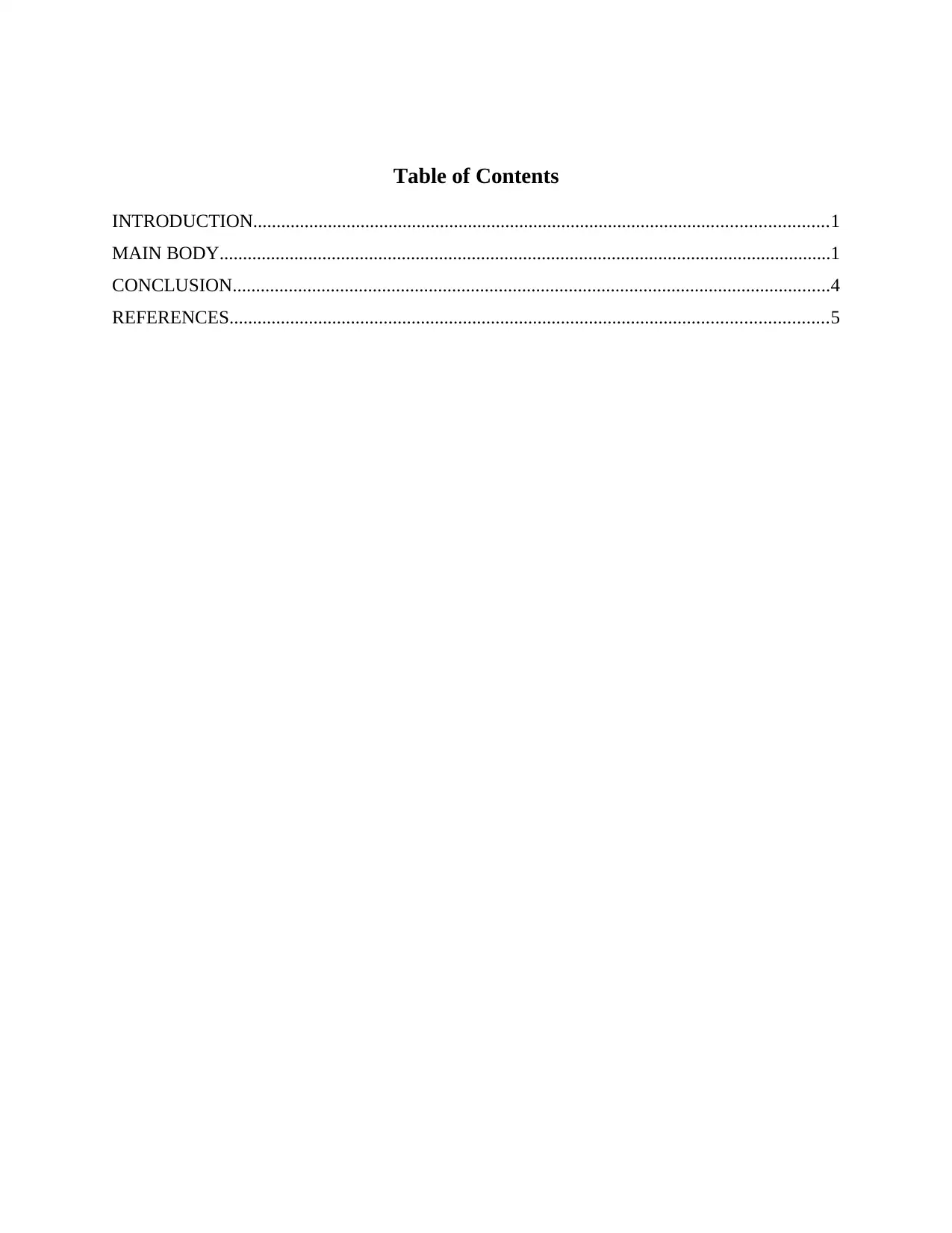
Table of Contents
INTRODUCTION...........................................................................................................................1
MAIN BODY...................................................................................................................................1
CONCLUSION................................................................................................................................4
REFERENCES................................................................................................................................5
INTRODUCTION...........................................................................................................................1
MAIN BODY...................................................................................................................................1
CONCLUSION................................................................................................................................4
REFERENCES................................................................................................................................5
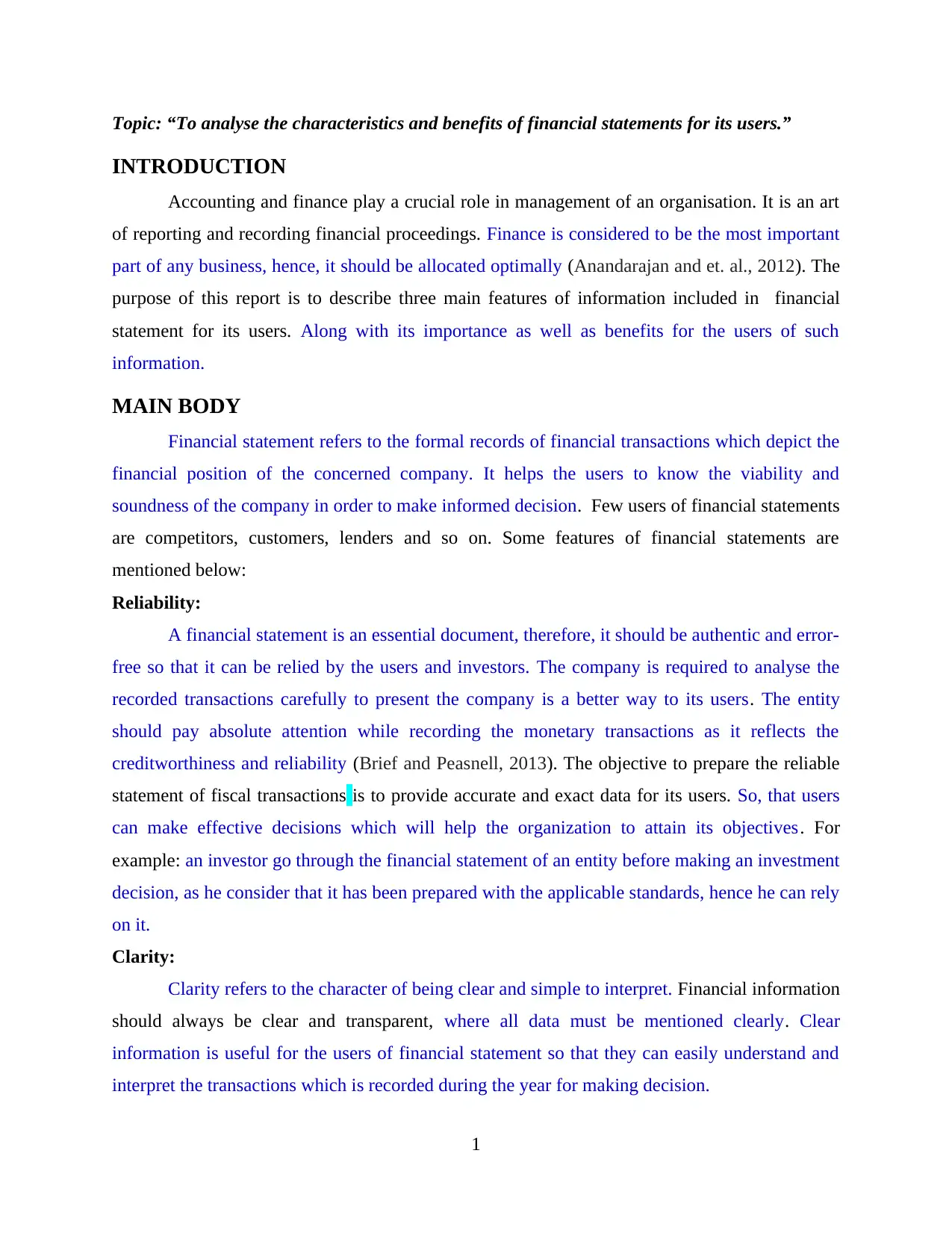
Topic: “To analyse the characteristics and benefits of financial statements for its users.”
INTRODUCTION
Accounting and finance play a crucial role in management of an organisation. It is an art
of reporting and recording financial proceedings. Finance is considered to be the most important
part of any business, hence, it should be allocated optimally (Anandarajan and et. al., 2012). The
purpose of this report is to describe three main features of information included in financial
statement for its users. Along with its importance as well as benefits for the users of such
information.
MAIN BODY
Financial statement refers to the formal records of financial transactions which depict the
financial position of the concerned company. It helps the users to know the viability and
soundness of the company in order to make informed decision. Few users of financial statements
are competitors, customers, lenders and so on. Some features of financial statements are
mentioned below:
Reliability:
A financial statement is an essential document, therefore, it should be authentic and error-
free so that it can be relied by the users and investors. The company is required to analyse the
recorded transactions carefully to present the company is a better way to its users. The entity
should pay absolute attention while recording the monetary transactions as it reflects the
creditworthiness and reliability (Brief and Peasnell, 2013). The objective to prepare the reliable
statement of fiscal transactions is to provide accurate and exact data for its users. So, that users
can make effective decisions which will help the organization to attain its objectives. For
example: an investor go through the financial statement of an entity before making an investment
decision, as he consider that it has been prepared with the applicable standards, hence he can rely
on it.
Clarity:
Clarity refers to the character of being clear and simple to interpret. Financial information
should always be clear and transparent, where all data must be mentioned clearly. Clear
information is useful for the users of financial statement so that they can easily understand and
interpret the transactions which is recorded during the year for making decision.
1
INTRODUCTION
Accounting and finance play a crucial role in management of an organisation. It is an art
of reporting and recording financial proceedings. Finance is considered to be the most important
part of any business, hence, it should be allocated optimally (Anandarajan and et. al., 2012). The
purpose of this report is to describe three main features of information included in financial
statement for its users. Along with its importance as well as benefits for the users of such
information.
MAIN BODY
Financial statement refers to the formal records of financial transactions which depict the
financial position of the concerned company. It helps the users to know the viability and
soundness of the company in order to make informed decision. Few users of financial statements
are competitors, customers, lenders and so on. Some features of financial statements are
mentioned below:
Reliability:
A financial statement is an essential document, therefore, it should be authentic and error-
free so that it can be relied by the users and investors. The company is required to analyse the
recorded transactions carefully to present the company is a better way to its users. The entity
should pay absolute attention while recording the monetary transactions as it reflects the
creditworthiness and reliability (Brief and Peasnell, 2013). The objective to prepare the reliable
statement of fiscal transactions is to provide accurate and exact data for its users. So, that users
can make effective decisions which will help the organization to attain its objectives. For
example: an investor go through the financial statement of an entity before making an investment
decision, as he consider that it has been prepared with the applicable standards, hence he can rely
on it.
Clarity:
Clarity refers to the character of being clear and simple to interpret. Financial information
should always be clear and transparent, where all data must be mentioned clearly. Clear
information is useful for the users of financial statement so that they can easily understand and
interpret the transactions which is recorded during the year for making decision.
1
⊘ This is a preview!⊘
Do you want full access?
Subscribe today to unlock all pages.

Trusted by 1+ million students worldwide
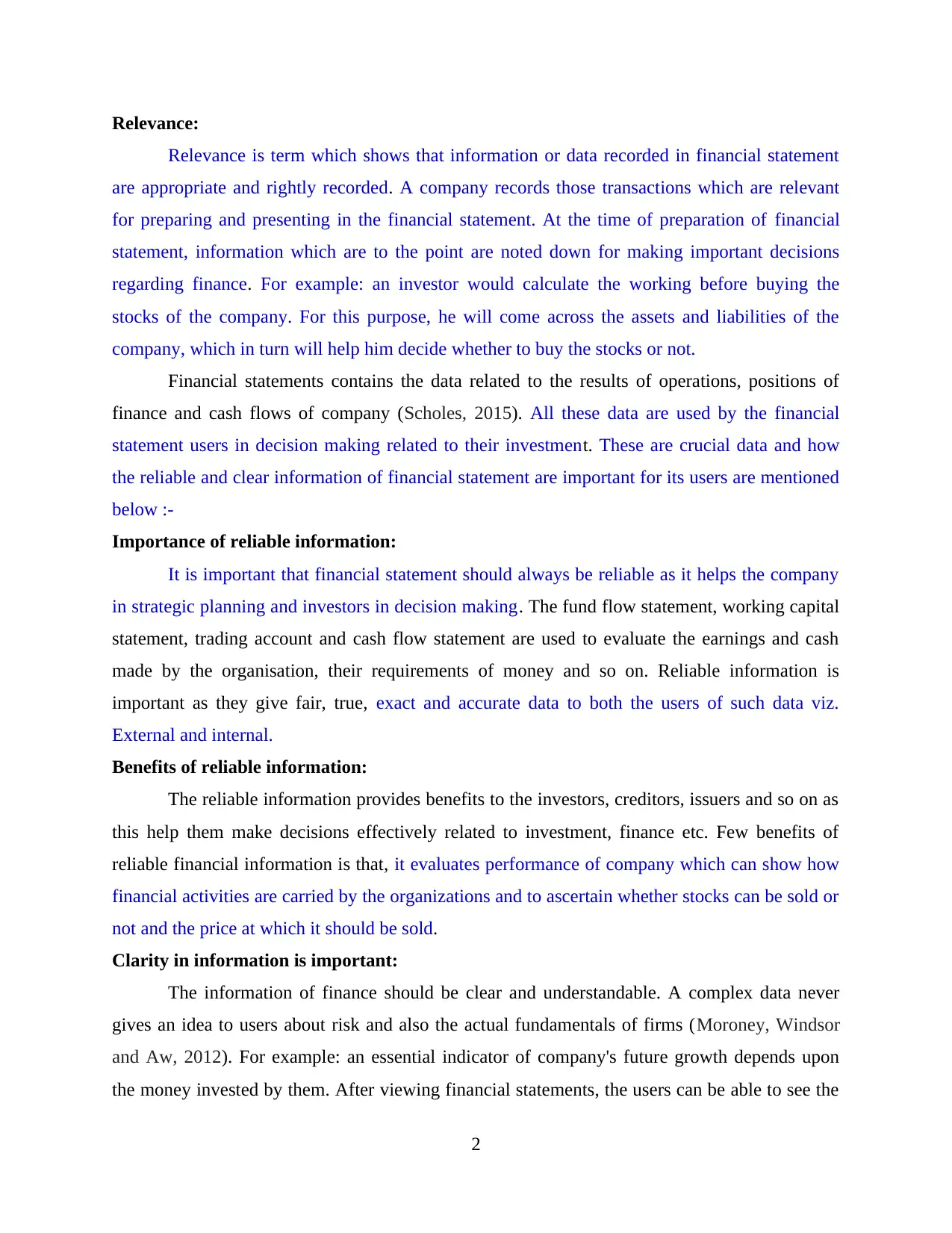
Relevance:
Relevance is term which shows that information or data recorded in financial statement
are appropriate and rightly recorded. A company records those transactions which are relevant
for preparing and presenting in the financial statement. At the time of preparation of financial
statement, information which are to the point are noted down for making important decisions
regarding finance. For example: an investor would calculate the working before buying the
stocks of the company. For this purpose, he will come across the assets and liabilities of the
company, which in turn will help him decide whether to buy the stocks or not.
Financial statements contains the data related to the results of operations, positions of
finance and cash flows of company (Scholes, 2015). All these data are used by the financial
statement users in decision making related to their investment. These are crucial data and how
the reliable and clear information of financial statement are important for its users are mentioned
below :-
Importance of reliable information:
It is important that financial statement should always be reliable as it helps the company
in strategic planning and investors in decision making. The fund flow statement, working capital
statement, trading account and cash flow statement are used to evaluate the earnings and cash
made by the organisation, their requirements of money and so on. Reliable information is
important as they give fair, true, exact and accurate data to both the users of such data viz.
External and internal.
Benefits of reliable information:
The reliable information provides benefits to the investors, creditors, issuers and so on as
this help them make decisions effectively related to investment, finance etc. Few benefits of
reliable financial information is that, it evaluates performance of company which can show how
financial activities are carried by the organizations and to ascertain whether stocks can be sold or
not and the price at which it should be sold.
Clarity in information is important:
The information of finance should be clear and understandable. A complex data never
gives an idea to users about risk and also the actual fundamentals of firms (Moroney, Windsor
and Aw, 2012). For example: an essential indicator of company's future growth depends upon
the money invested by them. After viewing financial statements, the users can be able to see the
2
Relevance is term which shows that information or data recorded in financial statement
are appropriate and rightly recorded. A company records those transactions which are relevant
for preparing and presenting in the financial statement. At the time of preparation of financial
statement, information which are to the point are noted down for making important decisions
regarding finance. For example: an investor would calculate the working before buying the
stocks of the company. For this purpose, he will come across the assets and liabilities of the
company, which in turn will help him decide whether to buy the stocks or not.
Financial statements contains the data related to the results of operations, positions of
finance and cash flows of company (Scholes, 2015). All these data are used by the financial
statement users in decision making related to their investment. These are crucial data and how
the reliable and clear information of financial statement are important for its users are mentioned
below :-
Importance of reliable information:
It is important that financial statement should always be reliable as it helps the company
in strategic planning and investors in decision making. The fund flow statement, working capital
statement, trading account and cash flow statement are used to evaluate the earnings and cash
made by the organisation, their requirements of money and so on. Reliable information is
important as they give fair, true, exact and accurate data to both the users of such data viz.
External and internal.
Benefits of reliable information:
The reliable information provides benefits to the investors, creditors, issuers and so on as
this help them make decisions effectively related to investment, finance etc. Few benefits of
reliable financial information is that, it evaluates performance of company which can show how
financial activities are carried by the organizations and to ascertain whether stocks can be sold or
not and the price at which it should be sold.
Clarity in information is important:
The information of finance should be clear and understandable. A complex data never
gives an idea to users about risk and also the actual fundamentals of firms (Moroney, Windsor
and Aw, 2012). For example: an essential indicator of company's future growth depends upon
the money invested by them. After viewing financial statements, the users can be able to see the
2
Paraphrase This Document
Need a fresh take? Get an instant paraphrase of this document with our AI Paraphraser
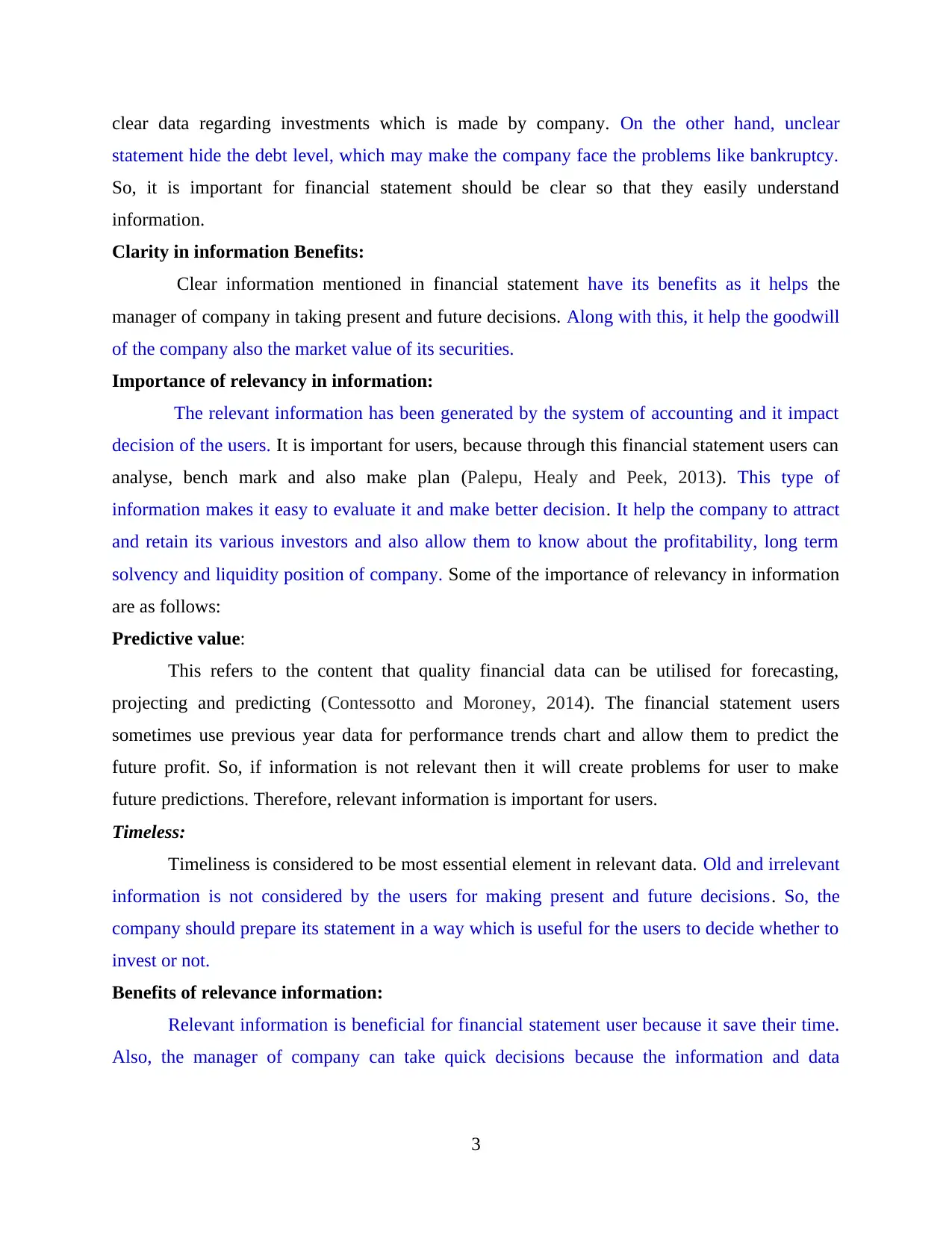
clear data regarding investments which is made by company. On the other hand, unclear
statement hide the debt level, which may make the company face the problems like bankruptcy.
So, it is important for financial statement should be clear so that they easily understand
information.
Clarity in information Benefits:
Clear information mentioned in financial statement have its benefits as it helps the
manager of company in taking present and future decisions. Along with this, it help the goodwill
of the company also the market value of its securities.
Importance of relevancy in information:
The relevant information has been generated by the system of accounting and it impact
decision of the users. It is important for users, because through this financial statement users can
analyse, bench mark and also make plan (Palepu, Healy and Peek, 2013). This type of
information makes it easy to evaluate it and make better decision. It help the company to attract
and retain its various investors and also allow them to know about the profitability, long term
solvency and liquidity position of company. Some of the importance of relevancy in information
are as follows:
Predictive value:
This refers to the content that quality financial data can be utilised for forecasting,
projecting and predicting (Contessotto and Moroney, 2014). The financial statement users
sometimes use previous year data for performance trends chart and allow them to predict the
future profit. So, if information is not relevant then it will create problems for user to make
future predictions. Therefore, relevant information is important for users.
Timeless:
Timeliness is considered to be most essential element in relevant data. Old and irrelevant
information is not considered by the users for making present and future decisions. So, the
company should prepare its statement in a way which is useful for the users to decide whether to
invest or not.
Benefits of relevance information:
Relevant information is beneficial for financial statement user because it save their time.
Also, the manager of company can take quick decisions because the information and data
3
statement hide the debt level, which may make the company face the problems like bankruptcy.
So, it is important for financial statement should be clear so that they easily understand
information.
Clarity in information Benefits:
Clear information mentioned in financial statement have its benefits as it helps the
manager of company in taking present and future decisions. Along with this, it help the goodwill
of the company also the market value of its securities.
Importance of relevancy in information:
The relevant information has been generated by the system of accounting and it impact
decision of the users. It is important for users, because through this financial statement users can
analyse, bench mark and also make plan (Palepu, Healy and Peek, 2013). This type of
information makes it easy to evaluate it and make better decision. It help the company to attract
and retain its various investors and also allow them to know about the profitability, long term
solvency and liquidity position of company. Some of the importance of relevancy in information
are as follows:
Predictive value:
This refers to the content that quality financial data can be utilised for forecasting,
projecting and predicting (Contessotto and Moroney, 2014). The financial statement users
sometimes use previous year data for performance trends chart and allow them to predict the
future profit. So, if information is not relevant then it will create problems for user to make
future predictions. Therefore, relevant information is important for users.
Timeless:
Timeliness is considered to be most essential element in relevant data. Old and irrelevant
information is not considered by the users for making present and future decisions. So, the
company should prepare its statement in a way which is useful for the users to decide whether to
invest or not.
Benefits of relevance information:
Relevant information is beneficial for financial statement user because it save their time.
Also, the manager of company can take quick decisions because the information and data
3
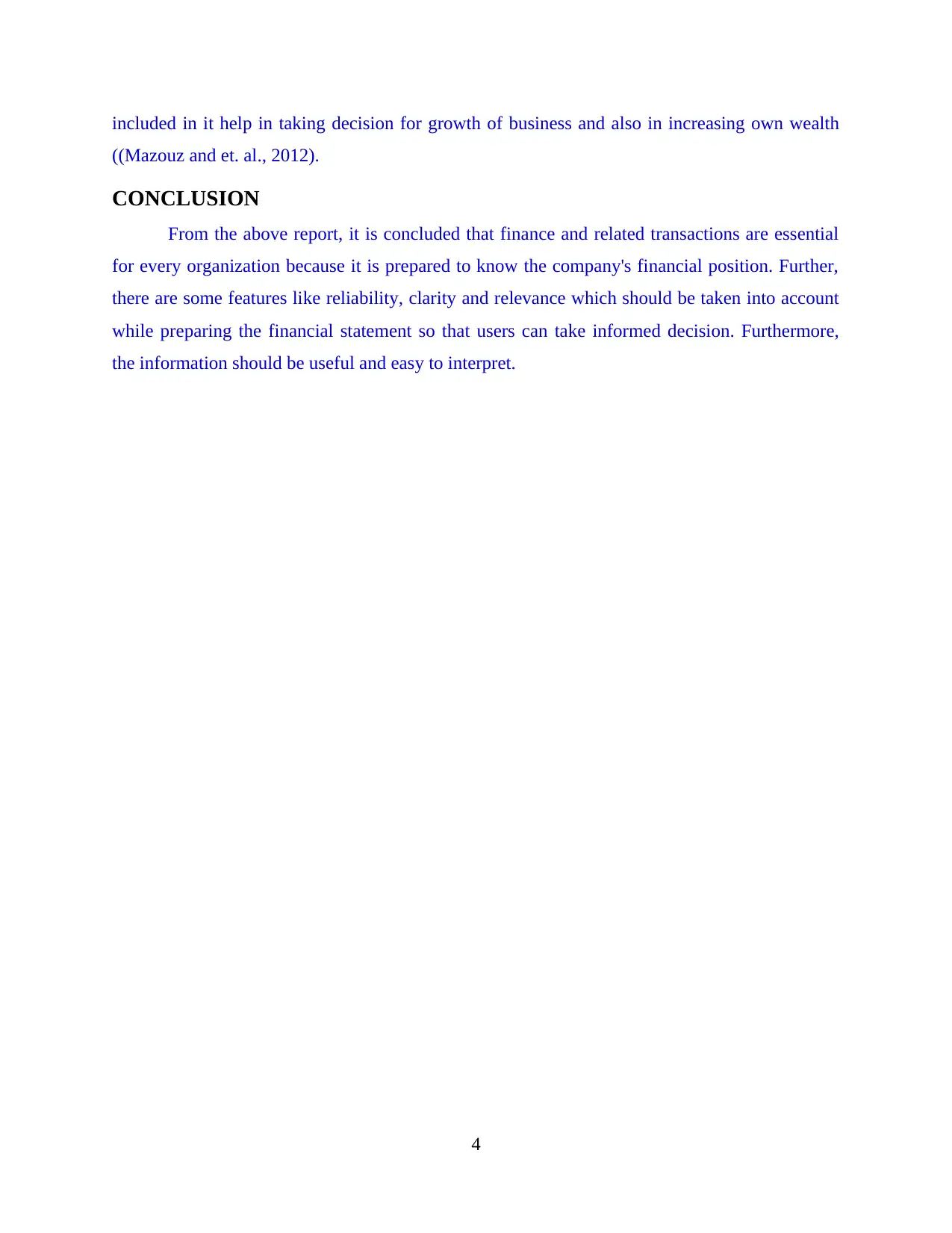
included in it help in taking decision for growth of business and also in increasing own wealth
((Mazouz and et. al., 2012).
CONCLUSION
From the above report, it is concluded that finance and related transactions are essential
for every organization because it is prepared to know the company's financial position. Further,
there are some features like reliability, clarity and relevance which should be taken into account
while preparing the financial statement so that users can take informed decision. Furthermore,
the information should be useful and easy to interpret.
4
((Mazouz and et. al., 2012).
CONCLUSION
From the above report, it is concluded that finance and related transactions are essential
for every organization because it is prepared to know the company's financial position. Further,
there are some features like reliability, clarity and relevance which should be taken into account
while preparing the financial statement so that users can take informed decision. Furthermore,
the information should be useful and easy to interpret.
4
⊘ This is a preview!⊘
Do you want full access?
Subscribe today to unlock all pages.

Trusted by 1+ million students worldwide
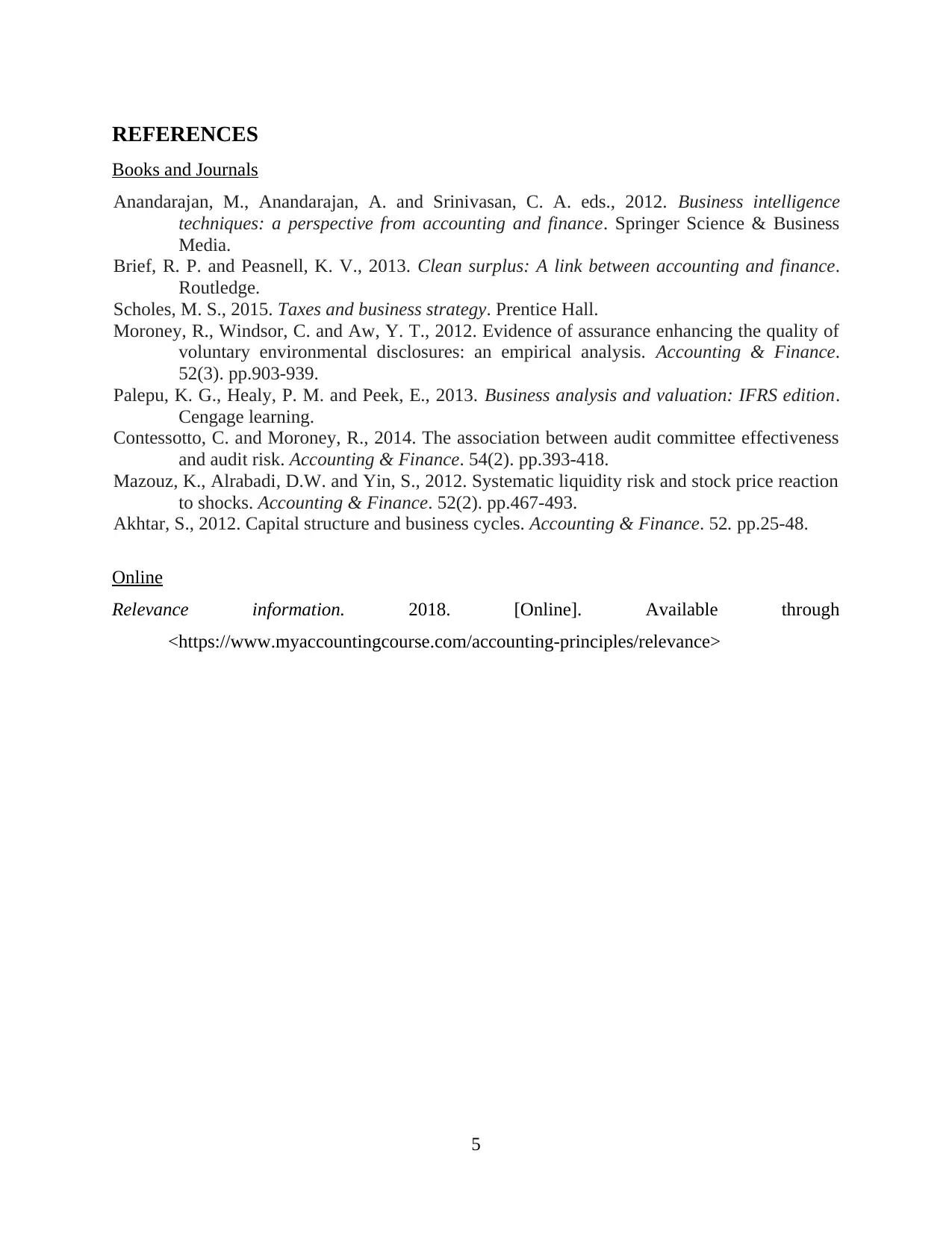
REFERENCES
Books and Journals
Anandarajan, M., Anandarajan, A. and Srinivasan, C. A. eds., 2012. Business intelligence
techniques: a perspective from accounting and finance. Springer Science & Business
Media.
Brief, R. P. and Peasnell, K. V., 2013. Clean surplus: A link between accounting and finance.
Routledge.
Scholes, M. S., 2015. Taxes and business strategy. Prentice Hall.
Moroney, R., Windsor, C. and Aw, Y. T., 2012. Evidence of assurance enhancing the quality of
voluntary environmental disclosures: an empirical analysis. Accounting & Finance.
52(3). pp.903-939.
Palepu, K. G., Healy, P. M. and Peek, E., 2013. Business analysis and valuation: IFRS edition.
Cengage learning.
Contessotto, C. and Moroney, R., 2014. The association between audit committee effectiveness
and audit risk. Accounting & Finance. 54(2). pp.393-418.
Mazouz, K., Alrabadi, D.W. and Yin, S., 2012. Systematic liquidity risk and stock price reaction
to shocks. Accounting & Finance. 52(2). pp.467-493.
Akhtar, S., 2012. Capital structure and business cycles. Accounting & Finance. 52. pp.25-48.
Online
Relevance information. 2018. [Online]. Available through
<https://www.myaccountingcourse.com/accounting-principles/relevance>
5
Books and Journals
Anandarajan, M., Anandarajan, A. and Srinivasan, C. A. eds., 2012. Business intelligence
techniques: a perspective from accounting and finance. Springer Science & Business
Media.
Brief, R. P. and Peasnell, K. V., 2013. Clean surplus: A link between accounting and finance.
Routledge.
Scholes, M. S., 2015. Taxes and business strategy. Prentice Hall.
Moroney, R., Windsor, C. and Aw, Y. T., 2012. Evidence of assurance enhancing the quality of
voluntary environmental disclosures: an empirical analysis. Accounting & Finance.
52(3). pp.903-939.
Palepu, K. G., Healy, P. M. and Peek, E., 2013. Business analysis and valuation: IFRS edition.
Cengage learning.
Contessotto, C. and Moroney, R., 2014. The association between audit committee effectiveness
and audit risk. Accounting & Finance. 54(2). pp.393-418.
Mazouz, K., Alrabadi, D.W. and Yin, S., 2012. Systematic liquidity risk and stock price reaction
to shocks. Accounting & Finance. 52(2). pp.467-493.
Akhtar, S., 2012. Capital structure and business cycles. Accounting & Finance. 52. pp.25-48.
Online
Relevance information. 2018. [Online]. Available through
<https://www.myaccountingcourse.com/accounting-principles/relevance>
5
Paraphrase This Document
Need a fresh take? Get an instant paraphrase of this document with our AI Paraphraser

6
1 out of 8
Related Documents
Your All-in-One AI-Powered Toolkit for Academic Success.
+13062052269
info@desklib.com
Available 24*7 on WhatsApp / Email
![[object Object]](/_next/static/media/star-bottom.7253800d.svg)
Unlock your academic potential
Copyright © 2020–2026 A2Z Services. All Rights Reserved. Developed and managed by ZUCOL.





